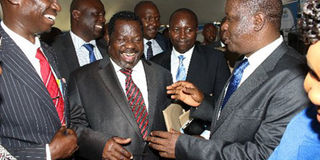Curriculum drafters to hold first meeting

Education, Science and Technology Cabinet Secretary Fred Matiang’i (right) with Kenya National Union of Teachers chairman Mudzo Nzili (centre), other union officials and teachers on January 21, 2016. PHOTO | JEFF ANGOTE | NATION MEDIA GROUP
What you need to know:
- Meeting will review or updates on latest proposals to seek consensus.
A key meeting is expected in Nairobi this week to preview the proposed new education curriculum for schools. Education, Science and Technology Cabinet Secretary Fred Matiang’i calling the meeting is an indication of the government’s determination to complete the reform, one of the promises of the Jubilee administration.
The Nation has established that a technical team of curriculum drafters met Dr Matiang’i on Tuesday last week to brief him on options proposed.
Also at the meeting was former Education assistant minister and presidential adviser Kilemi Mwiria.
Dr Matiang’i, who is also the chair of the national steering team in the reform, called for the meeting this week for updates and to seek consensus. The meeting will be held at the Safari Park Hotel and Casino in Nairobi.
On Saturday, director of the curriculum agency, Dr Julius Jwan, said: “The meeting has been called by my boss (Dr Matiang’i) and is part of our critical consensus building process".
He said also that teachers’ unions, churches, universities and development partners will attend the meeting. Meanwhile, the Bible Society of Kenya is proposing that pastoral instruction be introduced in secondary schools to help children avoid negative trends such as promiscuity.
In their recommendations to the team, the society says pastoral teaching will deal with drug abuse, violent unrest and instil positive values and morals.
They said Christian Religious Education should be a compulsory subject examinable at Form Four. It is currently optional.
The document also proposes that chaplaincy be formalised in schools.
The document, signed by the society's head of operations Thomas Tharao, also wants the government to “recommend Christian religious education as a basis for studies of law at the university”.
It recommends that the number of lessons allocated for the subject per week in primary and secondary schools be increased.
“The curriculum developers should provide adequate reasons why other subjects like languages and sciences are given more lessons per week than art subjects,” the document says.
The society’s proposals mirror those released by Catholics bishops and clergy under the umbrella of the National Council of Churches of Kenya that called for homegrown positive values in the curriculum. The churches also proposed a two-year pilot.
The Kenya Union of Special Needs Education Teachers is suggesting that physical education be made compulsory and tested for the deaf, blind, and physically disabled.
The union also wants multiple choice questions to be done away with and replaced by structured questions for all subjects to prevent guesswork.
“For Kenya to realise its goal, all primary and secondary schools must offer special needs education,” says the union’s statement, which is signed by James Torome.



